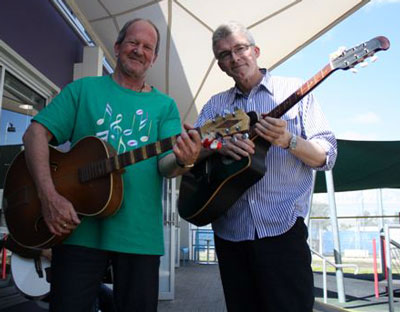© Music for Refugees
History of the Project
Being a musician and realising that music is a wonderful stress reliever, Philip Feinstein began a campaign to assist children and adults in detention by way of music classes and jam sessions. He also organised the collection of music instruments for refugees in detention. The project began in 2009 at the Villawood Detention Centre in Sydney and with the help of the public, it has now expanded to all detention centres throughout Australia. “We are a giving nation and I am proud of the way the Australian public has helped with this mission.”
For an insight into the project so far, see the media reports on this site.
When Philip first approached the SERCO staff at Villawood Detention Centre with his music project, he quickly learned that there were no music instruments available. So, by spreading the word around, he encouraged people to donate instruments. Within a short period of time all 5 sections at Villawood had pianos and other instruments. Music rooms have now been set up throughout the centre and there are many instruments available for the refugees to play - pianos, guitars, violins, recorders, percussion, and more. And this is all because of our generous and understanding public. However, the project of collecting instruments is ongoing as many of the instruments are given to individual refugees to keep when they are released. Their stress is ongoing . . .

Philip Feinstein and Adriaan Mees help at Villawood.
Apart from music jams in the now established music rooms, music classes are also an important part of the project to help refugees with stress.
With the assistance of guitar teacher, Adriaan Mees, there are classes now being held in all sections of Villawood, including the family and kids section.
Being aware of the importance of self-esteem, another program Feinstein instigated for the kids is that of Theatre Sports. He discovered how quickly they can adapt to new ideas despite English not being their mother tongue.
And for the adults he offers a stop smoking program based on behaviour modification and personal growth.
It is important to note that the detainees cannot just walk out of the centre for entertainment, education or anything else. They are confined behind the wire until they get clearance to become citizens. For some that can take a long time. And for others maybe never . . . . As Australian citizens with the freedom to do anything, we should be more mindful of those incarcerated with only a glimmer of hope.
An appropriate statement from Rosemary Signorelli of STARTTS really sums it up: “The reality is that everyone in the family has been traumatised, and the parents have gone to great lengths to seek safety and a good future for their children.”
It is also worth remembering that our society and country can benefit enormously when many of these people become citizens - our country is made up of immigrants, many of whom have already given lots to Australia.
